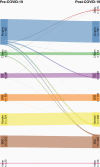CovidNeuroOnc: A UK multicenter, prospective cohort study of the impact of the COVID-19 pandemic on the neuro-oncology service
- PMID: 34056602
- PMCID: PMC7928638
- DOI: 10.1093/noajnl/vdab014
CovidNeuroOnc: A UK multicenter, prospective cohort study of the impact of the COVID-19 pandemic on the neuro-oncology service
Abstract
Background: The COVID-19 pandemic has profoundly affected cancer services. Our objective was to determine the effect of the COVID-19 pandemic on decision making and the resulting outcomes for patients with newly diagnosed or recurrent intracranial tumors.
Methods: We performed a multicenter prospective study of all adult patients discussed in weekly neuro-oncology and skull base multidisciplinary team meetings who had a newly diagnosed or recurrent intracranial (excluding pituitary) tumor between 01 April and 31 May 2020. All patients had at least 30-day follow-up data. Descriptive statistical reporting was used.
Results: There were 1357 referrals for newly diagnosed or recurrent intracranial tumors across 15 neuro-oncology centers. Of centers with all intracranial tumors, a change in initial management was reported in 8.6% of cases (n = 104/1210). Decisions to change the management plan reduced over time from a peak of 19% referrals at the start of the study to 0% by the end of the study period. Changes in management were reported in 16% (n = 75/466) of cases previously recommended for surgery and 28% of cases previously recommended for chemotherapy (n = 20/72). The reported SARS-CoV-2 infection rate was similar in surgical and non-surgical patients (2.6% vs. 2.4%, P > .9).
Conclusions: Disruption to neuro-oncology services in the UK caused by the COVID-19 pandemic was most marked in the first month, affecting all diagnoses. Patients considered for chemotherapy were most affected. In those recommended surgical treatment this was successfully completed. Longer-term outcome data will evaluate oncological treatments received by these patients and overall survival.
Keywords: COVID-19; SARS-CoV-2; brain tumor; intracranial tumor; neuro-oncology.
© The Author(s) 2021. Published by Oxford University Press, the Society for Neuro-Oncology and the European Association of Neuro-Oncology.
Figures



References
-
- Lai AG, Pasea L, Banerjee A, et al. Estimated impact of the COVID-19 pandemic on cancer services and excess 1-year mortality in people with cancer and multimorbidity: near real-time data on cancer care, cancer deaths and a population-based cohort study. BMJ Open. 2020;10:e043828. doi:10.1136/bmjopen-2020-043828 - DOI - PMC - PubMed
-
- Cancer Research UK. Over 2 Million People Waiting for Cancer Screening, Tests and Treatments. Oxford, United Kingdom: Cancer Research UK; 2020.
Grants and funding
LinkOut - more resources
Full Text Sources
Other Literature Sources
Miscellaneous
